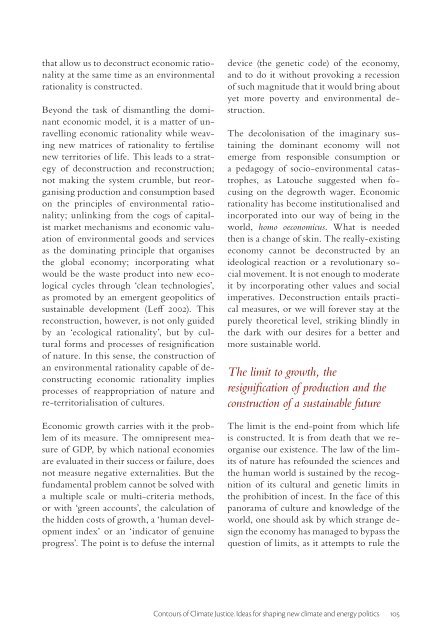Contours of Climate Justice - Dag Hammarskjöld Foundation
Contours of Climate Justice - Dag Hammarskjöld Foundation
Contours of Climate Justice - Dag Hammarskjöld Foundation
Create successful ePaper yourself
Turn your PDF publications into a flip-book with our unique Google optimized e-Paper software.
that allow us to deconstruct economic rationality<br />
at the same time as an environmental<br />
rationality is constructed.<br />
Beyond the task <strong>of</strong> dismantling the dominant<br />
economic model, it is a matter <strong>of</strong> unravelling<br />
economic rationality while weaving<br />
new matrices <strong>of</strong> rationality to fertilise<br />
new territories <strong>of</strong> life. This leads to a strategy<br />
<strong>of</strong> deconstruction and reconstruction;<br />
not making the system crumble, but reorganising<br />
production and consumption based<br />
on the principles <strong>of</strong> environmental rationality;<br />
unlinking from the cogs <strong>of</strong> capitalist<br />
market mechanisms and economic valuation<br />
<strong>of</strong> environmental goods and services<br />
as the dominating principle that organises<br />
the global economy; incorporating what<br />
would be the waste product into new ecological<br />
cycles through ‘clean technologies’,<br />
as promoted by an emergent geopolitics <strong>of</strong><br />
sustainable development (Leff 2002). This<br />
reconstruction, however, is not only guided<br />
by an ‘ecological rationality’, but by cultural<br />
forms and processes <strong>of</strong> resignifi cation<br />
<strong>of</strong> nature. In this sense, the construction <strong>of</strong><br />
an environmental rationality capable <strong>of</strong> deconstructing<br />
economic rationality implies<br />
processes <strong>of</strong> reappropriation <strong>of</strong> nature and<br />
re-territorialisation <strong>of</strong> cultures.<br />
Economic growth carries with it the problem<br />
<strong>of</strong> its measure. The omnipresent measure<br />
<strong>of</strong> GDP, by which national economies<br />
are evaluated in their success or failure, does<br />
not measure negative externalities. But the<br />
fundamental problem cannot be solved with<br />
a multiple scale or multi-criteria methods,<br />
or with ‘green accounts’, the calculation <strong>of</strong><br />
the hidden costs <strong>of</strong> growth, a ‘human development<br />
index’ or an ‘indicator <strong>of</strong> genuine<br />
progress’. The point is to defuse the internal<br />
device (the genetic code) <strong>of</strong> the economy,<br />
and to do it without provoking a recession<br />
<strong>of</strong> such magnitude that it would bring about<br />
yet more poverty and environmental destruction.<br />
The decolonisation <strong>of</strong> the imaginary sustaining<br />
the dominant economy will not<br />
emerge from responsible consumption or<br />
a pedagogy <strong>of</strong> socio-environmental catastrophes,<br />
as Latouche suggested when focusing<br />
on the degrowth wager. Economic<br />
rationality has become institutionalised and<br />
incorporated into our way <strong>of</strong> being in the<br />
world, homo oeconomicus. What is needed<br />
then is a change <strong>of</strong> skin. The really-existing<br />
economy cannot be deconstructed by an<br />
ideological reaction or a revolutionary social<br />
movement. It is not enough to moderate<br />
it by incorporating other values and social<br />
imperatives. Deconstruction entails practical<br />
measures, or we will forever stay at the<br />
purely theoretical level, striking blindly in<br />
the dark with our desires for a better and<br />
more sustainable world.<br />
The limit to growth, the<br />
resignifi cation <strong>of</strong> production and the<br />
construction <strong>of</strong> a sustainable future<br />
The limit is the end-point from which life<br />
is constructed. It is from death that we reorganise<br />
our existence. The law <strong>of</strong> the limits<br />
<strong>of</strong> nature has refounded the sciences and<br />
the human world is sustained by the recognition<br />
<strong>of</strong> its cultural and genetic limits in<br />
the prohibition <strong>of</strong> incest. In the face <strong>of</strong> this<br />
panorama <strong>of</strong> culture and knowledge <strong>of</strong> the<br />
world, one should ask by which strange design<br />
the economy has managed to bypass the<br />
question <strong>of</strong> limits, as it attempts to rule the<br />
<strong>Contours</strong> <strong>of</strong> <strong>Climate</strong> <strong>Justice</strong>. Ideas for shaping new climate and energy politics 105
















